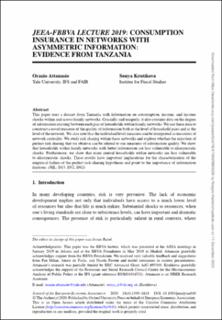| dc.description.abstract | This paper uses a dataset from Tanzania with information on consumption, income, and income
shocks within and across family networks. Crucially and uniquely, it also contains data on the degree
of information existing between each pair of households within family networks. We use these data to
construct a novel measure of the quality of information both at the level of household pairs and at the
level of the network. We also note that the individual level measures can be interpreted as measures of
network centrality. We study risk sharing within these networks and explore whether the rejection of
perfect risk sharing that we observe can be related to our measures of information quality. We show
that households within family networks with better information are less vulnerable to idiosyncratic
shocks. Furthermore, we show that more central households within networks are less vulnerable
to idiosyncratic shocks. These results have important implications for the characterisation of the
empirical failure of the perfect risk-sharing hypothesis and point to the importance of information
frictions | en_US |
